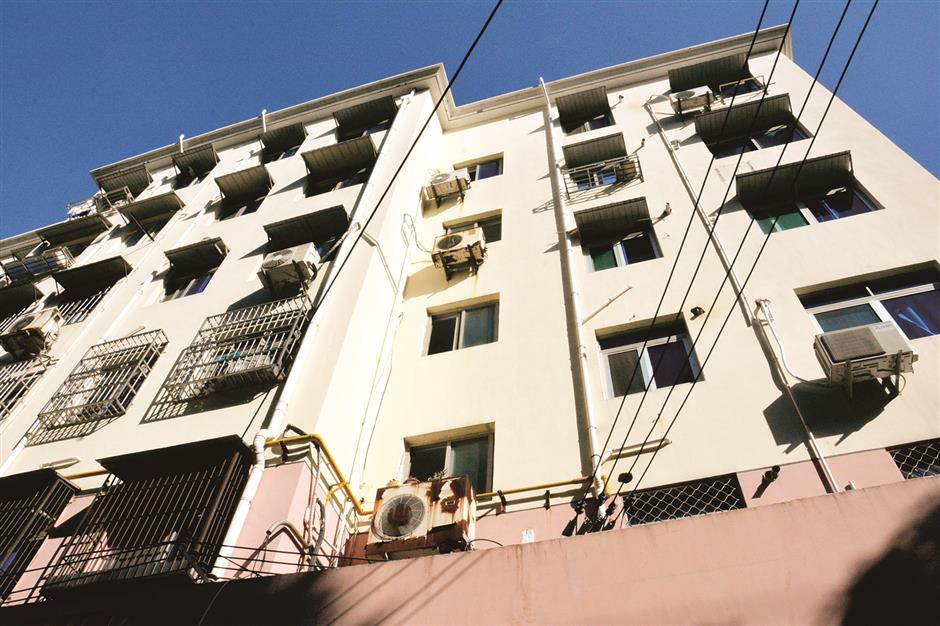Elevating the lifestyle of elderly and disabled in old buildings
About 220,000 residential buildings in Shanghai don’t have elevators, according to the city housing authority, and some two-fifths of the 1 million households living in them are 60 years or older.
That means stairs to climb and descend if an elderly resident wants to go out. For disabled people, the lack of an elevator may mean they rarely leave home.
Shanghai has issued regulations on the installation of elevators in old buildings, in an attempt to encourage local communities to address the problem.
According to the city, it costs about 600,000 yuan (US$87,980.41) to install an elevator in a six-story building. The government subsidizes 40 percent of the cost. The rest of the cost falls on residents.
The regulations have spurred old housing estates in Minhang to mobilize residents and seek to have elevators installed. We take a look at a few.
Dongfeng No. 1 Housing Estate
In Jiangchuan Road Subdistrict

Dongfeng No.1 Housing Estate
This housing estate was built for workers in 1959, shortly after Shanghai decided to build satellite towns focused on suburban industrial production.
“It was a piece of cake to climb four floors when I was young,” said Hu Shuan, 86. “But with age, it has become a difficult task. I run out of breath on the third floor and need to stop and rest.
He said most of the residents are elderly. Many haven’t moved out or couldn’t leave because of economic and personal reasons.
“Many of us have deep feelings for our neighborhood,” he explained.
The estate is in a convenient location on Jiangchuan Road, where a new Metro station is under construction.
The main difficulty of installing an elevator is securing approval from residents and local officials, and apportioning the cost not covered by subsidies among households.
Hu, the retired manager of a Minhang hotel, drew on his business experience to organize a preparatory group for the project.
He and his son Hu Kai, 60, are responsible for legal documents and contracts. Another resident is responsible for finance and soliciting opinions from neighbors. According to city regulations, the project needs the consent of 90 percent of the residents in the building, with the remaining 10 percent voicing no strong objections.
Hu’s building is connected with two other buildings, which means that the approval process covers all 35 households in the three buildings.
Hu has lost 7 kilograms and even required a hospital rest for a while because the project taxed his strength.
But Hu’s efforts are paying off. The district government has approved plans for the project, and preparatory work is now underway on construction details to install an elevator.
Xincheng Estate
In Xinzhuang Town
Xu Sihong, director of the Xincheng Estate committee, said the lack of an elevator has long been a concern of residents.
Last year, residents sent the committee a petition urging the installation of an elevator.
Households living on the third to sixth floors have to bear the biggest portion of costs not covered by a 240,000-yuan subsidy from the government. That works out to be between 40,000 yuan and 80,000 yuan per household.
The whole process is long and drawn out. The major obstacles come from residents themselves.
“For example, a resident on the first floor who recently moved in refused to pay for the elevator because the decision was made before he came and an elevator is of no use to him,” said Xu.
Xu said she is optimistic the resident will change his mind.
“I believe residents can put themselves in other people’s’ shoes and want to help,” she said.
Wang Ling, director of the Xinzhuang Town Community Office, said half the 140 housing estates in Xinzhuang aren’t equipped with elevators.
Yang Qigeng, a legislator in Xinzhuang Town, has long been concerned about the problem. In 2015, he has submitted a proposal to the congress to install elevators in old residential estates to help the elderly and disabled.
Attitudes are changing, Yang said. Conditions are now better for getting residents to agree to paying for the installation of an elevator.
Yang registered a company in February and contacted designers from elevator companies to build a team. Their expertise can save time because some government agencies aren’t all that familiar with the process yet. The team has visited six potential estates in the town, offering free plan-drafting services.
“I hope that Xinzhuang Town will be a pioneer and set a precedent,” Yang said.

Tang Guorong, chief of the Jinmin Fudi housing estate, points out at the building that will soon get a new elevator.
Jinming Fudi Housing Estate
In Jiangchuan Road Subdistrict
Tang Guorong, the director of Jinming Fudi Housing Estate owner committee, said he was relieved when the Minhang Planning and Land Resources Department approved the installation of elevators in the estate.
When he first heard of city efforts to encourage installation of elevators, he organized a team to inspect the rules and learn what steps had to be taken.
“We were excited because it was clear to us that installing elevators in our own estate was feasible,” said Tang.
The design process went fairly smoothly. Households on the highest floors will pay the most toward installation costs, and residents on the first and second floors will be given a payment of 5,000 yuan to help them defray costs apportioned to them.
“Most of the residents are retirees on limited pensions,” said Tang. “It’s a big deal for them to spend this amount of money.”
Two households in each building will be appointed elevator custodians responsible for daily maintenance.
















